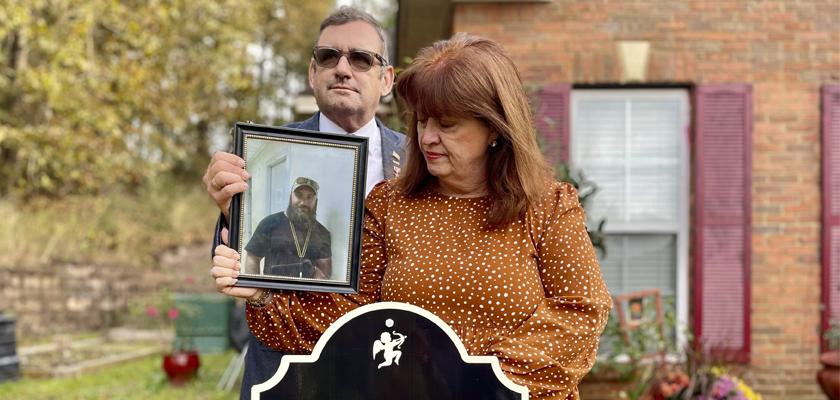When Mary Pears called 911 because her veteran son suffering from post-traumatic stress disorder (PTSD) appeared to be having a mental health crisis, she hoped to get him help and keep everyone safe.
Within minutes, 32-year-old Jonathan Pears was dead, fatally shot by a sheriff's deputy in the front yard of his parents' Alabama home.
“I wanted someone to talk him down. I wanted someone to come help us to get him calmed down. I absolutely did not want them to kill my son, nor did I ever think that would happen,” Mary Pears said.
The tragic end to their call for help didn't have to happen, the family said. Now, they want changes in how officers respond to a mental health crisis and have filed a lawsuit accusing the Elmore County Sheriff's Office of using excessive force.
The sheriff’s office has said Jonathan Pears refused orders to drop an 18-inch (46-centimeter) knife while walking toward officers and his father, but his parents maintain that he hadn’t threatened anyone and wasn’t close enough to be a danger. Experts say deadly force can be justified when a person is armed with a knife, but without an immediate threat, officers can take time to assess the situation and use nonlethal means to try to subdue them.
The sheriff's department in neighboring Chilton County reviewed the shooting, and its findings are expected to go to a grand jury Thursday, said Julian McPhillips, an attorney for the family. Elmore County Sheriff Bill Franklin has declined to comment on the case, citing the ongoing investigation and litigation.
Born into a military family, Jonathan Pears served first as an airman and then as a contractor in Afghanistan. When he returned, he struggled with PTSD and other mental health issues, according to his father, retired Air Force Col. Andy Pears.
Jonathan stayed at a Veterans Affairs hospital for 30 days of mental health treatment shortly before the shooting, his parents said. Mary Pears could tell her son's condition was deteriorating again. He had stopped taking his meds and was distraught about the decision to withdraw troops from Afghanistan.
Things came to a fateful head on July 28, 2021. A volatile argument began when his parents tried to express concern for his well-being. Mary Pears called 911 after Jonathan took a swing at his father.
“I’d safely say after carefully observing his actions that afternoon, that Jonathan suffered a massive psychotic break,” she said.
Jonathan, who had been target shooting in the family's backyard, had a handgun at the beginning of the argument, but his parents took it away and locked it in a bedroom. Mary Pears said she told the 911 operator that her son had PTSD from military service and was unarmed.
The dispatcher told her deputies were coming through the woods. “I’m like, ‘Why are they coming through the woods? Just send someone to the front door. He’s unarmed,’” she said.
Hearing that someone was coming to the house, “Jonathan kept saying, ‘I’m not going back. I’m not going back,’” his mother recalled.
Mary Pears said she initially thought he was referring to the hospital, but Andy Pears believes his son was referring to Afghanistan.
“I know he was having a flashback with Afghanistan. We used to talk a lot about Afghanistan and share our PTSD experiences,” he said.
Andy Pears stepped outside the front door with his hands up to greet the first responders and brief them on the situation. He said the arriving deputies tackled him, dragged him down the steep front yard and handcuffed him.
From the bottom of the yard, Andy Pears said he saw his son walk away from the house and turn right, the same direction officers were approaching from.
"They yelled, 'Drop the effing knife. Drop the effing knife. Drop the effing knife,'” Andy Pears said.
Then gunshots fired.
“I saw him then start to stumble and wheeze and then go down. He fell right here,” Andy Pears said, pointing to the spot on the yard where his son died.
A deputy told the parents they had to shoot because he was coming at his father with a knife, but the family's lawsuit maintains “the truth was absolutely the opposite”.
W. Lloyd Grafton, a use-of-force expert, said a man with a knife can cross 20 feet (6 meters) in just a couple of seconds, so an officer can justify using deadly force at that distance. Andy Pears measured the distance from where he remembers officers standing to where his son was shot, estimating that officers were 90 feet (27 meters) away. The Associated Press cannot verify the distance.
McPhillips, the family’s lawyer, said the fatal shooting was “totally unnecessary” at that distance: “He could have used a Taser. He could have used chemical spray. He didn’t have to shoot.”
Greg Meyer, a retired Los Angeles Police Department captain who is an internationally recognized use-of-force expert, said that when a person is armed with a weapon like a knife, deadly force may be needed if there is an immediate threat to someone’s safety. He said other techniques can be employed when there is no immediate threat, such as a standoff or a person far away.
"Then it is best to keep your distance, remain behind any available cover, attempt to have a conversation with the subject to get him or her to put down the weapon, and get back-up units and a variety of nonlethal weapons options on the way," Meyer wrote in an email.
The Pears family said they want officers to have more training on de-escalation tactics, use of nonlethal weapons and dispatching mental health professionals on calls involving psychiatric emergencies.
They also want Alabama law changed to require the use of body cameras and the release of the footage along with providing more help for returning veterans.
“The main thing I want to come out of this is that other parents don't have to go through what we're going through right now,” Andy Pears said.










